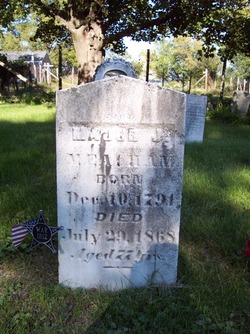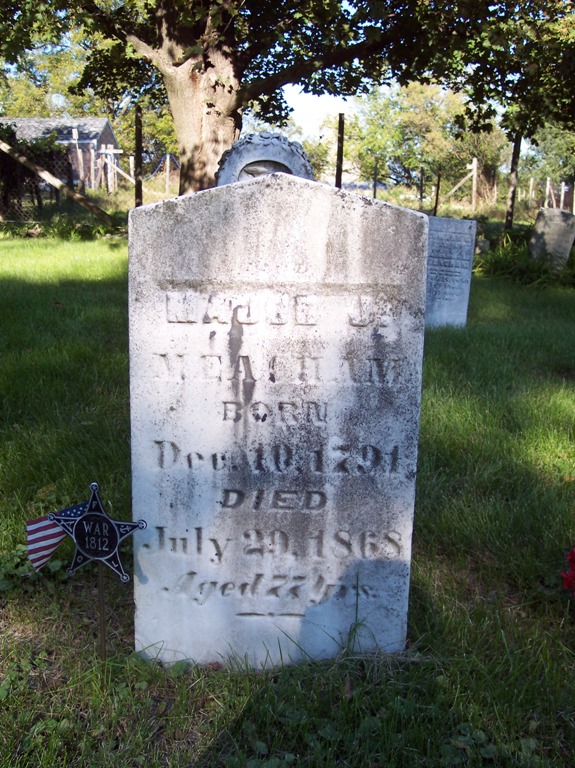He was prominent in all activities of the township. In 1844 he built the first dam and flour mill in this part of the country. Meacham also built the largest barn in the area. It was 44 x 100 feet.This barn was used for recreational as well as practical purposes. In 1837, Maj. Jesse Meacham also helped establish the first post office in the town of Troy, and he was named the postmaster. In 1839 Meacham helped organize the first school district in the township. He was the husband of Patience Wallace Meacham.
HISTORICAL SKETCH: just prior to the formation of the "Wisconsin Territory" - in the fall of 1835. Major Jesse Meacham and A. Spoor accompanied Sewall Andrews {founder of Mukwonago, Waukesha Co., WI. -ed.} from Chicago {then, a mere 3,000 souls -ed.} to Milwaukee Village {which was being settled -ed.}, where Milo Jones joined them, proceeding with a team, to the southwest, they tented-out on the open prairie, now the site of the city of Janesville, returning via Chicago, to his native State, remained until the spring of 1836, came to Milwaukee, met Henry H. Camp, and with him, reached the Indian village of "Mequonago", in May, 1836. Major Jessie Meacham was one week ahead of them, a present of two barrels of flour induced the Indians to allow them to build a bark roofed shanty, 10x12 feet, in their village, prior to this, they built, but did not occupy, a similar hut on Sec. 22, these were very first log buildings ever erected by a pale-face in Mukwonago, the "Logs" {as they were then called -ed.} were removed in 1837, but many returned and staid for years, the village plot was surveyed by Martin Field and Ira Blood, in the fall of 1836, in the spring of 1837, Mr. A. built a store and brought-in the first goods from New York City, this was the trade center for twenty-miles around, and the hardy frontier merchant reaped rich rewards, after relinquishing mercantile business, Mr. A. owned the grist mill five-years, but of late, has given his attention to cuTroy - was one of the earliest, if not the first town settled, or in which claims were made in the county. Jesse Meacham and Adolphus Spoor selected claims there in the fall of 1835 and moved on to them in May '36. Soon after, and in the same year, came Othni Beardsley, his brother Alexander, and a young man by the name of Roberts, also George Robinson, and brothers. Othni Beardsley, commenced plowing May 16th, '36. This was probably the second plowing done in the county. Palmer Gardner having done the first, in Spring Prairie. During the summer of '37, Dea. George Hibbard, Elias Hibbard, and Dea. Augustus Smith (all from Hadley, Mass.), came in. Hence, I suppose, the large fields of broom corn, for which Troy was early noted. Also in the same year came Mr. Perry, father of John A. Perry, with his son, Alban. Many others settled there about the same time, whose names I have not been able to procure. It is related among the incidents of this town, that Major Meacham and a man by the man of Bigelow, got into a controversy about a claim, and as there were no courts or lawyers in the county, they resorted to the ancient usage of trial by "wager of battle" in a single combat, to decide the right. Being men of about equal weight 200 pounds, or upwards, and very muscular, the contest was long and severe. But finally, the Major threw his antagonist, and sat on him till he gave in to his terms. The mill site in this town was early improved by the erection of a grist mill, and the dam constructed to create the water power by flowing back upon the extensive marshes, has caused considerable litigation.
SOURCE: Collections of the Wisconsin State Historical Society, Vol-6, page 460.the first of that material erected in Waukesha County.
SOURCE (Google Books): "The History of Waukesha County, Wisconsin", 1880 (1006 pages), page 965.
Source [link]: http://books.google.com/books?id=vQ4rAQAAMAAJ&pg=PA965&
He was prominent in all activities of the township. In 1844 he built the first dam and flour mill in this part of the country. Meacham also built the largest barn in the area. It was 44 x 100 feet.This barn was used for recreational as well as practical purposes. In 1837, Maj. Jesse Meacham also helped establish the first post office in the town of Troy, and he was named the postmaster. In 1839 Meacham helped organize the first school district in the township. He was the husband of Patience Wallace Meacham.
HISTORICAL SKETCH: just prior to the formation of the "Wisconsin Territory" - in the fall of 1835. Major Jesse Meacham and A. Spoor accompanied Sewall Andrews {founder of Mukwonago, Waukesha Co., WI. -ed.} from Chicago {then, a mere 3,000 souls -ed.} to Milwaukee Village {which was being settled -ed.}, where Milo Jones joined them, proceeding with a team, to the southwest, they tented-out on the open prairie, now the site of the city of Janesville, returning via Chicago, to his native State, remained until the spring of 1836, came to Milwaukee, met Henry H. Camp, and with him, reached the Indian village of "Mequonago", in May, 1836. Major Jessie Meacham was one week ahead of them, a present of two barrels of flour induced the Indians to allow them to build a bark roofed shanty, 10x12 feet, in their village, prior to this, they built, but did not occupy, a similar hut on Sec. 22, these were very first log buildings ever erected by a pale-face in Mukwonago, the "Logs" {as they were then called -ed.} were removed in 1837, but many returned and staid for years, the village plot was surveyed by Martin Field and Ira Blood, in the fall of 1836, in the spring of 1837, Mr. A. built a store and brought-in the first goods from New York City, this was the trade center for twenty-miles around, and the hardy frontier merchant reaped rich rewards, after relinquishing mercantile business, Mr. A. owned the grist mill five-years, but of late, has given his attention to cuTroy - was one of the earliest, if not the first town settled, or in which claims were made in the county. Jesse Meacham and Adolphus Spoor selected claims there in the fall of 1835 and moved on to them in May '36. Soon after, and in the same year, came Othni Beardsley, his brother Alexander, and a young man by the name of Roberts, also George Robinson, and brothers. Othni Beardsley, commenced plowing May 16th, '36. This was probably the second plowing done in the county. Palmer Gardner having done the first, in Spring Prairie. During the summer of '37, Dea. George Hibbard, Elias Hibbard, and Dea. Augustus Smith (all from Hadley, Mass.), came in. Hence, I suppose, the large fields of broom corn, for which Troy was early noted. Also in the same year came Mr. Perry, father of John A. Perry, with his son, Alban. Many others settled there about the same time, whose names I have not been able to procure. It is related among the incidents of this town, that Major Meacham and a man by the man of Bigelow, got into a controversy about a claim, and as there were no courts or lawyers in the county, they resorted to the ancient usage of trial by "wager of battle" in a single combat, to decide the right. Being men of about equal weight 200 pounds, or upwards, and very muscular, the contest was long and severe. But finally, the Major threw his antagonist, and sat on him till he gave in to his terms. The mill site in this town was early improved by the erection of a grist mill, and the dam constructed to create the water power by flowing back upon the extensive marshes, has caused considerable litigation.
SOURCE: Collections of the Wisconsin State Historical Society, Vol-6, page 460.the first of that material erected in Waukesha County.
SOURCE (Google Books): "The History of Waukesha County, Wisconsin", 1880 (1006 pages), page 965.
Source [link]: http://books.google.com/books?id=vQ4rAQAAMAAJ&pg=PA965&
Family Members
Advertisement
Advertisement






